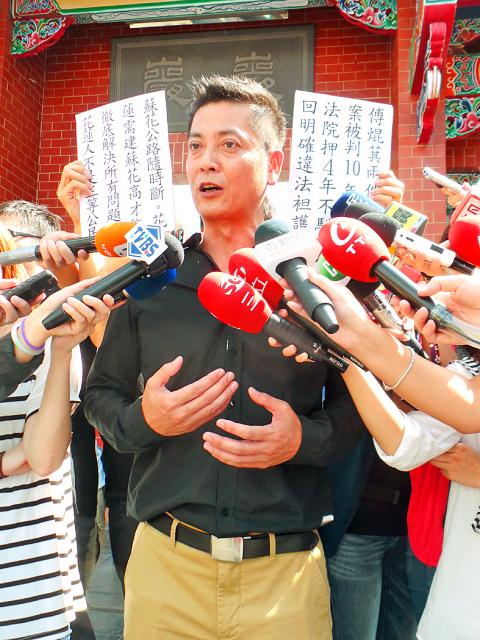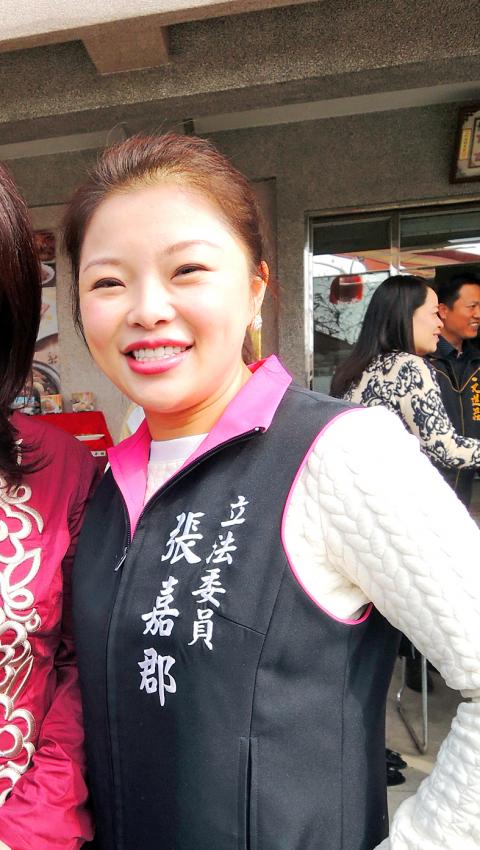Following former Chinese Nationalist Party (KMT) legislator Chang Sho-wen’s (張碩文) announcement of his withdrawal from the party on Monday, two KMT legislators yesterday threatened to do the same, with one saying the cross-strait policy of presumptive KMT presidential candidate Hung Hsiu-chu (洪秀柱) was the source of her misgivings.
Chang, who was also KMT Taipei mayoral candidate Sean Lien’s (連勝文) spokesperson during the campaign last year, released a statement on Monday announcing his withdrawal from the party.
He had said a day earlier that a ruling party “obsessed with a power struggle” is no longer worth supporting.

Photo: Kuo An-chia, Taipei Times
“I decided to leave the party to carry out more efforts that many people expect me to accomplish,” Chang said in the statement, adding that a political party should serve the public, rather than be “a fetter restricting individuals.”
Chang said that he left the party because he “came from the people, and as the KMT is now walking in the opposite direction from the people, I of course have to go back to the people.”
He is said to have planned to run for a legislative seat on the People First Party’s ticket, challenging Democratic Progressive Party (DPP) Legislator Gao Jyh-peng (高志鵬) in New Taipei City’s Sanchong District (三重).

Photo: Liao Shu-ling, Taipei Times
KMT Legislator Chi Kuo-tung (紀國棟), who failed to secure the party’s nomination to run in Taichung, said the KMT “has no regard for party members’ thoughts and deeds.”
After a high-level party member said that it is better to have the party lose members than to have members without a sense of identity, Chi said of course members should have a sense of party identity, but the party has to make itself worth identifying with.
“We do not need enemies when we have members aspiring for a smaller party,” Chi said.
When asked whether he would join the legislative race with another political party, Chi said it is too early to say, as the election is six months away.
However, he also underlined his resolution to run.
KMT Legislator Chang Chia-chun (張嘉郡) said she would consider withdrawing “if the party cannot be an open party, as it said it would be.”
Already nominated by the KMT to run for a third term in Yunlin County, Chang Chia-chun said there is strong opposition at the local level against Hung’s “one China, same interpretation.”
“I myself consider [Hung’s cross-strait policy] an idea that has gone off the track of the KMT’s consensus,” she said.
Chi agreed that Hung’s proposal has had “obvious impacts,” as “same interpretation and respective interpretations are miles apart.”
KMT Legislator Wu Yu-sheng (吳育昇) agreed that Hung has to adjust her cross-strait proposal so it would not harm the party’s legislative election prospects in central and southern Taiwan.
“I cannot blame Chang Chia-chun; I cannot even blame the DPP for categorizing Hung as a ‘unificationist,’” Wu said. “There will be pressure for Hung to make adjustments — and it will not be coming from the DPP, but from the KMT itself.”
Wu added that it is not difficult for Hung to make adjustments to her proposal, as the discussion for setting up reciprocal offices between the two sides of the Taiwan Strait has already been under way; the basic underlying logic of the measure is mutual recognition of one China, but employing different words for it, he said.
Hung simply has to revise the proposal “and make it consistent with the party’s” before July 19, the date of the party congress, Wu said.

Nipah virus infection is to be officially listed as a category 5 notifiable infectious disease in Taiwan in March, while clinical treatment guidelines are being formulated, the Centers for Disease Control (CDC) said yesterday. With Nipah infections being reported in other countries and considering its relatively high fatality rate, the centers on Jan. 16 announced that it would be listed as a notifiable infectious disease to bolster the nation’s systematic early warning system and increase public awareness, the CDC said. Bangladesh reported four fatal cases last year in separate districts, with three linked to raw date palm sap consumption, CDC Epidemic Intelligence

The manufacture of the remaining 28 M1A2T Abrams tanks Taiwan purchased from the US has recently been completed, and they are expected to be delivered within the next one to two months, a source said yesterday. The Ministry of National Defense is arranging cargo ships to transport the tanks to Taiwan as soon as possible, said the source, who is familiar with the matter. The estimated arrival time ranges from late this month to early next month, the source said. The 28 Abrams tanks make up the third and final batch of a total of 108 tanks, valued at about NT$40.5 billion

Two Taiwanese prosecutors were questioned by Chinese security personnel at their hotel during a trip to China’s Henan Province this month, the Mainland Affairs Council (MAC) said yesterday. The officers had personal information on the prosecutors, including “when they were assigned to their posts, their work locations and job titles,” MAC Deputy Minister and spokesman Liang Wen-chieh (梁文傑) said. On top of asking about their agencies and positions, the officers also questioned the prosecutors about the Cross-Strait Joint Crime-Fighting and Judicial Mutual Assistance Agreement, a pact that serves as the framework for Taiwan-China cooperation on combating crime and providing judicial assistance, Liang

Reports of Taiwanese going missing, being detained or interrogated, or having their personal liberties restricted in China increased about fourfold annually last year, the Mainland Affairs Council (MAC) said yesterday. Last year, 221 Taiwanese who traveled to China were reported missing, were detained and interrogated, or otherwise had their personal freedom restricted, up from 55 the previous year, the council said. Reopening group tours to China would be risky, as it would leave travelers with no way to seek help through official channels after Beijing shut down dialogue between the associations tasked with handling cross-strait tourism, the MAC said. Taipei’s Taiwan Strait Tourism